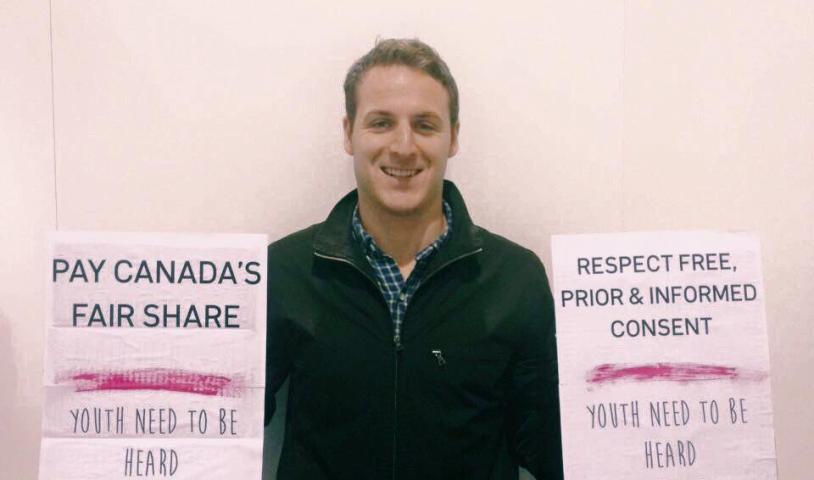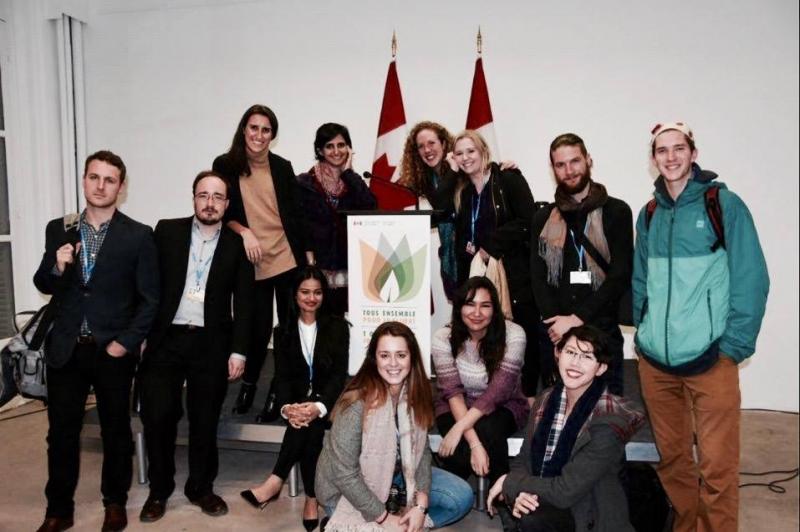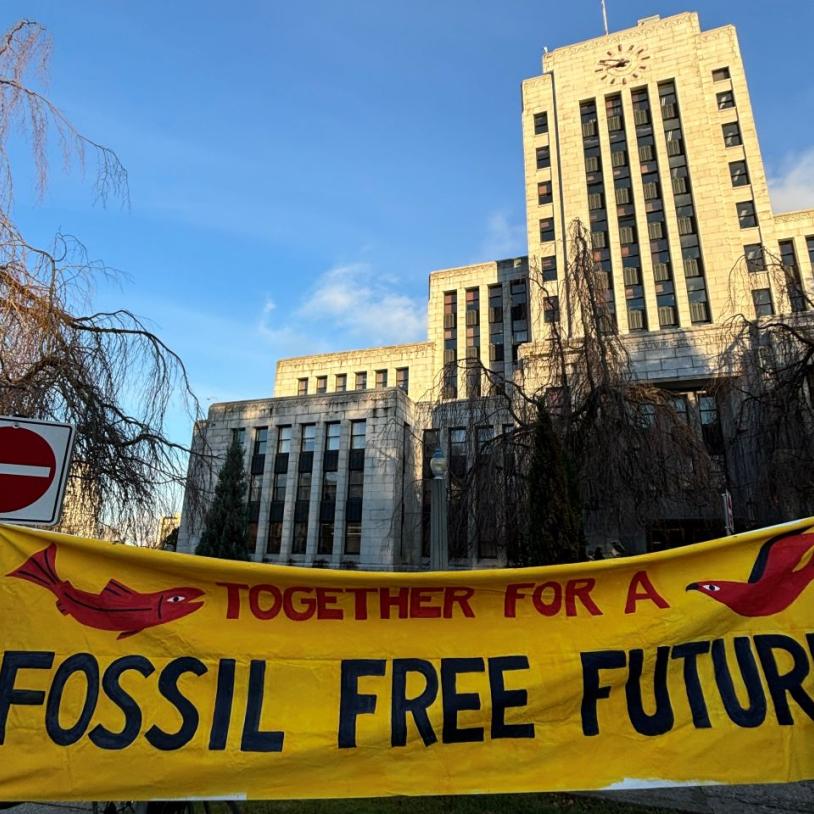Update from the UN climate summit
Monday, December 7, 2015
Torrance Coste, Vancouver Island Campaigner, reports from COP21 in Paris
December 8, 2015
I landed in Paris just a week and a half ago, but it feels like a lot longer than that. After a whirlwind of meetings, press releases, meetings, planning, meetings, demonstrations, press conferences, and more meetings, the first week of COP21 has somehow come to an end.
Canada lands with a splash, but ripples don’t spread far
Canada kicked off the conference working hard to cultivate the image of a progressive nation that is now “here to help.”
New Prime Minister Justice Trudeau roared into the conference with a delegation featuring five premiers and Environment and Climate Change Minister Catherine McKenna, who declared that “Canada is back” a few weeks ago.
On Sunday, Minister McKenna offered the first real sign of Canada’s newfound commitment when she supported vulnerable nations’ calls for an agreement that limits the increase in global temperatures to 1.5°celcius above pre-industrial levels. That is a priority for countries like the Philippines and Kiribati, who fear that temperatures any higher will swamp their low-lying nations.
Activists have echoed this goal with a rallying cry of Zero by 2050 (phase out ALL fossil fuels in the next 35 years) as a way to see it through. Unfortunately, when we met with McKenna and her staffers they wanted nothing to do with that target.
Canada’s support for 1.5°C is exciting, and hopefully that language will make it into the final agreement. But kicking fossil fuels by 2050 is what it will take to get there. Right now it’s like Canada is telling its friends it is going to take a trip somewhere, but it hasn’t even started looking into flights and hotels.
What we need to see from the government now is a national plan consistent with that goal – and we’re a long way from that. Considering what I’ve heard from the provincial premiers this week who will help draft the plan in the coming months, I won’t hold my breath.
British Columbia: A fossil fuel champion masquerading as a climate leader
The Province of BC was active in the Canadian Delegation in Paris – Premier Christy Clark attended several events during the first few days of COP21, and Environment Minister Mary Polak is here for the duration of the conference.
There are thousands of elected leaders here at this conference, but these two are the only ones I know about who are touting their credentials on climate change while simultaneously promoting the development of a new fossil fuel industry.
On the eve of the conference, BC’s Climate Leadership Team – commissioned by the government to make recommendations on the next steps for BC’s climate plan – issued its report, advising an increase to BC’s carbon tax starting this year, among other measures.
The government’s response?
“The provincial government has frozen the current $30/per tonne carbon tax until 2018 in order to allow other jurisdictions to catch up to British Columbia. The province would only consider an increase in the carbon tax under a regime where emission-intensive, trade-exposed industries are fully protected from any carbon tax increase.” (To read more, see the BC government’s press release)
The industry in question is LNG – BC’s elephant in the room – and “fully protected” sounds an awful lot like “exempt.” Increasing the carbon tax on apple farmers and Lululemon but not on fossil fuels is not climate leadership, and I said as much to Premier Clark and Minister Polak.
They both said that LNG from BC is needed to replace the use of coal in places like India and China, despite the fact that there is no evidence to support the claim that fracked gas will replace coal or oil or even that total emissions from LNG are substantially lower than traditional fossil fuels.
The BC government needs to be focusing on a rapid transition to a 100 per cent clean economy – communities and First Nations in the province are already leading on this. But instead, our Premier’s priority appears to be increasing competitiveness for climate-changing fossil fuel industries, and the world is realizing BC has lost its status as a climate leader.
Negotiations are moving, but not nearly fast enough
The first week of negotiations at COP21 have wrapped up, and feelings on progress are mixed. The target of 1.5°C is still in the text, but in brackets – meaning it is subject to change. The section on human rights remains in the pre-amble and not the main text, and “Indigenous Peoples” has been removed from a key article in the agreement. Slight changes in the wording of the document happen quickly, but the repercussions for people around the world are significant.
A few days ago I spoke with a youth delegate from Nigeria on the train to the conference center. He told me that where he lives there are two options for what to do with your life: farming or death. Climate change is increasing the frequency and intensity of droughts and extreme flooding events – both of which negatively impact agriculture and narrow the number of options for people in his community.
This kind of stark clarity makes obvious our responsibility to transition now and to make reparations to nations in the global south who have been less complicit in causing the climate crisis and who are already impacted by it in life-threatening ways.
The feeling on the ground at COP21 is that some sort of deal will be reached next week, but there is much less confidence that the agreement will go far enough.
I’ll continue to work here with the Canadian Youth Delegation to keep the pressure on our government and other world leaders to take steps towards a just and safe future.

The Canadian Youth Delegation at the COP21 Climate Summit in Paris
A day at COP21
Before coming to Paris, I had heard from former youth delegates and others that have attended COP that this conference would be one of the most intense, stressful, surreal experiences of my life. They sure weren’t kidding.
The scale (there are more people in the conference centre than the Northwest Territories) and pace (there are dozens of sessions, presentations, events, side-events, direct actions and press conferences happening at any given time) of this summit are absolutely staggering. I’m here with a team of 17 young climate activists from across Canada, so we split up into smaller groups to attend as many sessions as we can.
We get to the conference centre (about an hour outside the city) between 8 and 9 each morning, and remain here until 5 or 6 p.m. We take turns asking Canadian negotiators questions, doing media interviews and recapping our experiences in blogs and social media. Then we reconvene in the city by 8 p.m., where we meet to debrief, analyze the negotiation, and plan the next day’s activities until late into the night. Then we’re up at 6 a.m. to do the same thing again.
It’s a good thing COP is only two weeks…and that absurdly strong coffee is available on every street corner.
Meeting and working with activists and policy experts from around the world is a dream come true for me, and I can’t wait to bring everything I’m learning back to the west coast.
Despite the whirlwind pace here, I notice and appreciate the support from all of you, and I can’t wait to work together again soon.
For a better future,
Torrance Coste | Vancouver Island Campaigner
P.S. Keep up with the action live – actually, 9 hours ahead – by following me on twitter: @TorranceCoste





